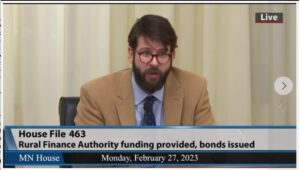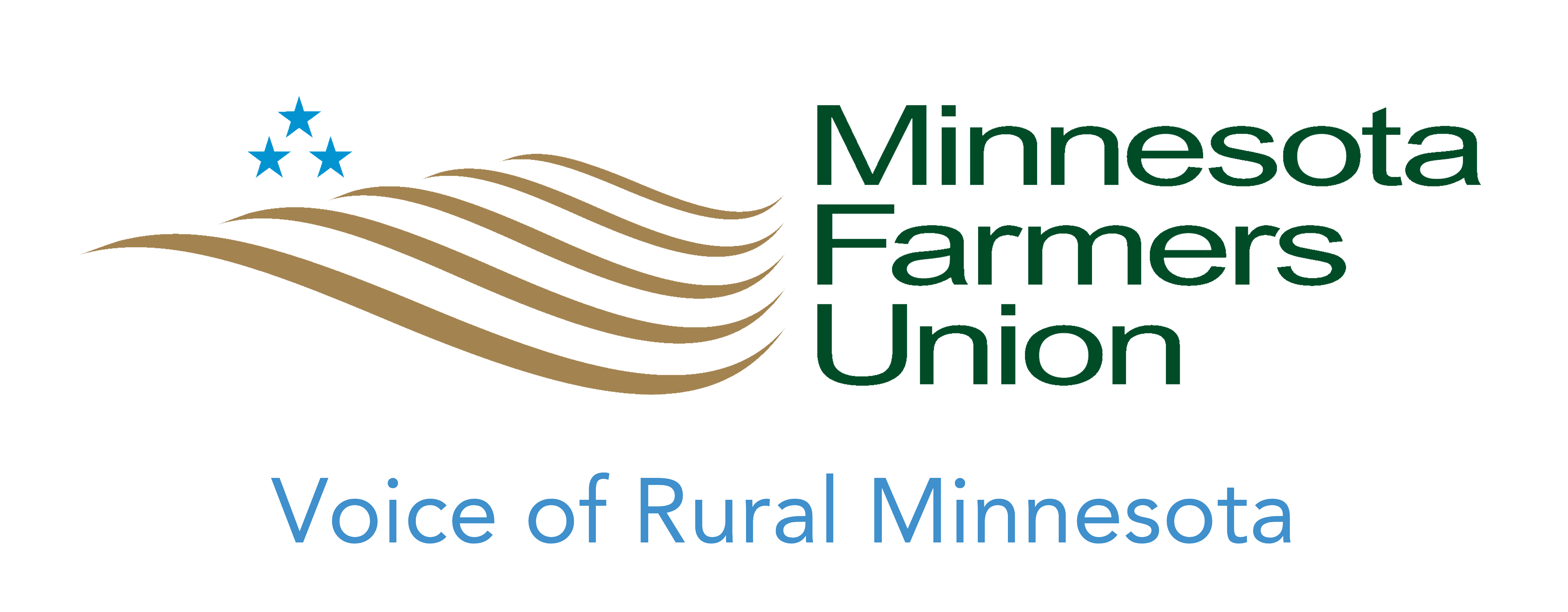Legislative Update: Lobby Day and stable budget forecast

The end of January was a busy one for Minnesota Farmers Union at the Capitol with our annual Lobby Day Drive-in and members and staff testifying nearly daily on priority issues from health care and low-interest financing to Right to Repair. In all of this, we worked hard to build the case for action on our priorities as defined by delegates to State Convention in November: Lowering health care costs, building more competitive markets, expanding local and regional processing, and building climate resilience.
On Feb. 27, the state received news that Minnesota’s massive budget surplus was stable at $17.5 billion, down marginally from the $17.6 billion estimated in December. Part of the slight reduction reflects a new law passed this session that requires state budgeters to include inflation into their forecast.
State revenue continued to be strong and lawmakers agree that stability is good news. That said, there are certainly disagreements about how to spend it. Gov. Walz emphasized investments in education and targeted relief for families, while Republican House Leader, Lisa Demuth, R-Cold Spring, echoed calls for long-term tax relief.
Those debates are taking shape as Senate Majority Leader Kari Dziedzic, DFL-Minneapolis, and House Speaker Melissa Hortman, DFL-Brooklyn Park, prepare to issue ‘budget targets’—topline numbers within which committee chairs negotiate their individual spending proposals for agriculture, transportation and other jurisdictions. New this year and due to the DFL trifecta, leaders have shared their intention to issue joint targets that apply to both House and Senate committees. This will help speed up end of session negotiations when chairs need to align their bills. For reference, last session the agriculture committee got a target that was $7.5 million over base funding, broadband got $25 million, and health and human services got $300 million.

News about the state budget and conversations about targets comes following an effective and memorable MFU Lobby Day Drive-in. Renewing this annual tradition, nearly 60 MFU members from across the state braved inclement weather to meet with legislative leaders, agriculture chairs and agency officials during a packed day on Feb. 15. MFU has made a practice of holding our Lobby Day early in session to start a conversation with lawmakers ahead of committee deadlines and important decisions about budget targets.
As a reminder, lawmakers will need to adhere to committee deadlines which were agreed to by legislative leaders late last week. Deadlines for this session are:
- Friday, March 10 — Committees must act favorably on policy bills in the house of origin.
- Friday, March 24 — Committees must act favorably on policy bills, or companions of bills, that met the first deadline in the other body.
- Tuesday, April 4 (5 p.m.) — Committees must act favorably on major appropriation and finance bills.
We started our lobby day with a conversation with the governor’s team and the Minnesota Department of Agriculture who outlined their budget proposals for agriculture. Their broader budget request—which was sent to lawmakers early in session—proposes important investments in healthcare affordability, meat processing, establishing a grain indemnity fund, and other issues central to our grassroots policy.
His budget request is well-aligned with MFU priorities. In the first biennium, Walz proposed investments in:
- Meat Processing
- $500,000 in grants to startup or expand existing plants through the AGRI Value-Added Program.
- $150,000 to hire a meat processing liaison (leveraging $150,000 in federal funds).
- Soil Health & Climate Resilience
- $4 million to expand the Soil Health Financial Assistance program that provides equipment grants for farmers.
- $4 million in investments that improve water quality through the Ag Best Management Revolving Loan Program ($6 million in ’26-’27).
- $300,000 to hire a climate coordinator to bring more federal money to Minnesota.
- $5 million to establish a grain indemnity fund to protect farmers affected by elevator collapses.
- $3 million to build out biofuels infrastructure, providing consumer access to higher blend fuels.
- Resources for beginning and emerging farmers including:
-
- $700,000 to expanding the Emerging Farmers Office (EFO).
- $400,000 for equipment and infrastructure grants.
- $500,000 for services to immigrant and BIPOC farmers and food business.
- $100,000 in funding for the Good Acre’s LEAFF program.
- $300,000 to expanding staff capacity at the Rural Finance Authority (RFA).
- $150,000 to expand the Minnesota Grown program.
- $500,000 to provide entrepreneurial support through expanding the New Markets Cost-Share program.
- $1.5 million to replenishing the ag emergency account to prepare for animal diseases.
- $500,000 to expand farm safety outreach and equipment grants and improve mental health outreach and services.
- $800,000 in funding for noxious weed programs.
- $700,000 in grants to Farmers Market hubs for aggregation, staff training, and program development.
- $300,000 to hire an additional international trade representative at MDA.
- $200,000 for pollinator research at the University of Minnesota.
- $400,000 in new support for county fairs.
The governor’s budget for agriculture also proposes updating MDA’s technology to improve service, modernizing and streamlining food licensing, securing funding for the RFA’s bonded loans and other investments.
From there, members met with Senate Majority Leader Kari Dziedzic, DFL-Minneapolis, who agreed to sign on as cosponsor to a bill MFU is leading to expand the Beginning Farmer Tax Credit. The proposal is being led by Agriculture Chairs Aric Putnam, DFL-St. Cloud, and Samantha Vang, DFL-Brooklyn Center, and will receive its first hearing in the Senate this week.
In addition to eliminating the sunset on this nation-leading program, the bill would:
- Extend the credit for sale of agriculture assets to family members, which will help more young farmers and assist in generational farm transition.
- Increase the credit for sale of agricultural assets to Black farmers, Indigenous farmers, and farmers of color who often aren’t coming into a family operation.
- Increase the credit for sale of agriculture assets from 5 percent to 8 percent and up to $50,000, adding additional incentive to transition ownership of farmland and to keep pace with increasing land values.
In a letter signed by a broad array of agriculture groups, MFU makes the case for expanding the program:
“As any farmer will tell you, farm transitions are complex, costly, seldom easy – any new farmer on the land is a win for our rural communities and the state . . . [and the] additional and needed support to emerging farmers who could benefit from the working relationships the credit helps broker with more established operators.”
In our meeting with Speaker of the House Melissa Hortman, DFL-Brooklyn Park, members who’d been hit with the Pipeline and Global Food Processing bankruptcies were able to share the importance of finally establishing a grain indemnity fund to protect grain producers. This proposal also has its first standalone hearing in the Senate at the start of March with Sen. Rob Kupec, DFL-Moorhead, leading the charge.
In MFU’s written testimony to the committee, President Gary Wertish laid out the case for our strong support of this proposal.
“We feel strongly about this issue, because our members and others who market grain are among the least protected in the nation,” he said. “This had real consequences for families who sold grain to elevators that have collapsed in recent years, including Porter in 2015, Ashby in 2018, Karlstad in 2019, Pipeline in 2021, and Global Processing just this past summer . . . I look forward to working with you to create a system that protects farmers.”
Outside of Lobby Day, MFU has been hard at work introducing bills and testifying on priority issues including establishing a Minnesota Care public option, funding the Rural Finance Authority, passing Right to Repair for agricultural equipment, expanding MDA’s soil health grant program, eliminating confidentiality clauses in carbon market contracts, increasing funding for small and regional meat processors. As always, if you have questions, thoughts, or concerns about MFU’s legislative work, contact Stu at (320) 232-3047 (C) or stu@mfu.org.
